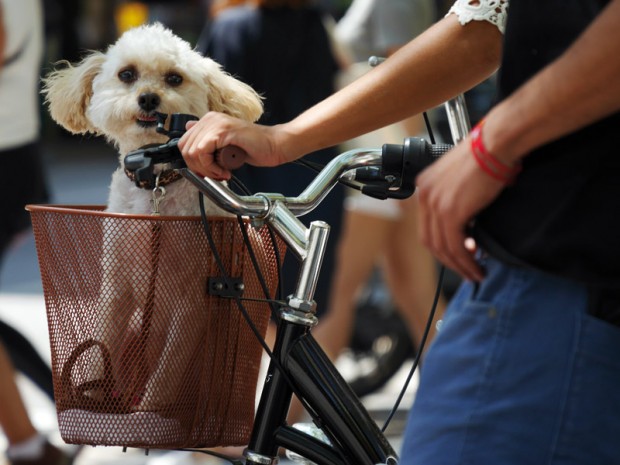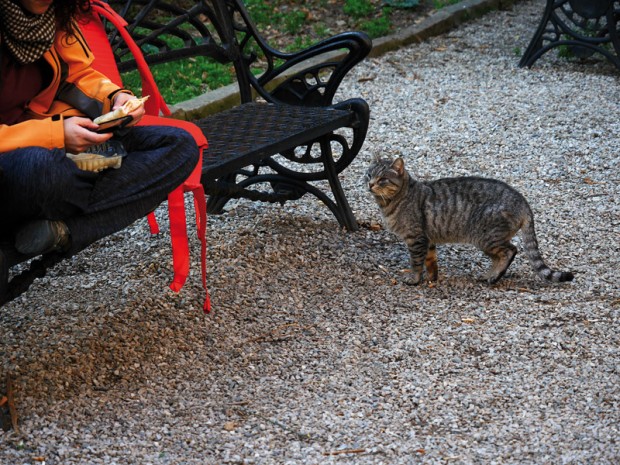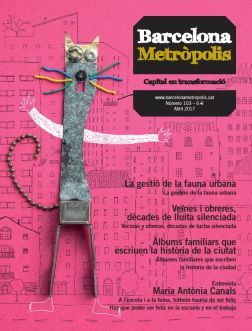Living with a pet is a right, but it also involves taking on a series of responsibilities to satisfy the animal’s physical and emotional needs, as well as respecting the rights and well–being of other people.

Animal rights go hand in hand with a series of obligations that their owners take on, both for the animals and for other members of the public, for the simple fact of owning a pet: that is what responsible ownership means. In the photo, a dog travels along Passeig de Gràcia in its owner’s bicycle basket.
Photo: Vicente Zambrano
Barcelona is a city committed to animal welfare, a fact evidenced by the ban on using wild animals in circuses and by the fact that it was the first city in Catalonia to outlaw the practice of destroying abandoned animals. This commitment began two decades ago in 1996, when the Municipal Council for the Defence and Protection of Animals (CMCDPA) was set up. That was followed two years later by the Municipal declaration on living with and respecting the rights of animals, which recognises that “all animals, of any species, have the right to be respected. They must not be subjected to abuse, excessive exertion, violent performances or acts of cruelty that cause them physical or mental suffering”. In 2003, the municipal dog pound was banned from putting down strays, and was renamed the Pet Adoption Centre (CAAC). That same year, the city introduced a ban on the use of wild animals in circuses and on bullfighting. These bans were all part of the first decree on the protection, ownership and sale of animals, which was amended in 2014 in order to recognise animals’ rights.
It is worth emphasising that, at the instigation of the Municipal Council for the Defence and Protection of Animals, all animal-welfare-related regulations were merged into a single decree, which is based on the principle that animals have legal rights that must be protected. Moreover, it reflects a commitment to raise awareness of, and foster harmonious coexistence between, wild, semi-dependent and captive animals living in the city. What’s more, the rights of animals go hand in hand with the duties of their owners.
Although the decree provides for increased awareness-raising of pet owners’ responsibilities and obligations — not only as regards the animals themselves but also the need to follow standards of behaviour and hygiene along with other members of the public — it is still not enough. Promoting animal welfare cant be done through legislation alone. The public must become more aware of their own responsibilities. To own an animal, one must meet a set of standards that ensures the well-being of both people and animals. It is pet owners who bear responsibility for complying with rules of conduct, avoiding anti-social behaviours that could disturb other members of the public. To foster greater mutual coexistence and civic-mindedness, we have started a process to adapt public spaces with measures aimed at ensuring this coexistence while also improving animal safety.
One of the measures included in the 2014 decree is the obligation to keep dogs on the leash. This was prompted by the large number of dogs that go missing in Barcelona — a traumatic experience, both for the dog and the owner, that clearly puts the dog’s life at risk — and by the sheer number of dogs in the city and the diverse ways in which the public space is used. What’s more, these animals are subjected to all kinds of stimuli that could cause them to behave in unexpected ways that are a danger to themselves, other dogs and people. The implementation of this measure is linked to the putting in place of other initiatives in every district of the city aimed at providing facilities for walking dogs — places where they can exercise off the lead — and identifying shared-use spaces at certain times of the day. The purpose of both of these initiatives is to achieve a diverse, respectful and consensual use of the public space. Dogs that are classed as potentially dangerous, however, must always be kept on a lead and muzzled when out in public, as stipulated in Act No. 10/1999.
Living with a pet is a right, but it also involves taking on a series of responsibilities to satisfy the animal’s physical and emotional needs. Many of the injustices suffered by arise from the lack of time, information or commitment on the part of the owner. Living with an animal means providing it with food and health care (deworming and defleaing treatments, vaccinations, neutering, etc.), and also meeting its emotional needs, making it feel part of the family group and, with dogs in particular, socialising them with other dogs and ensuring that they are not isolated.
Cat colonies
Another group of animals that share our public or private spaces are the colonies of feral, but properly sterilised, cats that form controlled groups. These groups are managed by Barcelona City Council in partnership with animal protection organisations. This system of monitored cat colonies — made up of groups that already share a particular space — allows us to enjoy their presence while alleviating the problems of overpopulation. Turning various groups of cats into a colony requires catching them, giving them a veterinary health check to rule out any contagious diseases, sterilising them, marking their ears so as to identify them and then returning them to the area in which they were caught. This then enables animal protection groups to monitor them and to provide assistance when one of the colonies has to be relocated. Occasionally colonies have to be moved, either because of building works or as part of a programme to develop biodiversity in other neighbourhoods.

Ferran Soldevila garden, in the University of Barcelona’s historic grounds (in the photo), is home to feral cats that are accustomed to human presence. In various parts of the city, colonies of these cats are managed by Barcelona City Council and animal protection organisations.
Photo: Vicente Zambrano
This system of controlled cat colonies located in a specific place eliminates disturbances (meowing when they’re on heat, fighting, etc.) and reduces health risks to the animals and residents. That is why it is so important that no-one should feed them outside the controlled areas. These monitored cats are used to eating dried kibble and giving them other foods could pose a risk to the colony and promote increases in other populations of animals. This latter problem is a particular issue for cat colonies living in Collserola Nature Park’s zones of influence, which attract wild boar. When wild animals such as boar become accustomed to urban environments, it poses a risk both to the people who feed the cat colony and to the cats themselves. With that in mind, we are trialling feeding systems for feral cats that boar are unable to access.
The animal rights policies implemented by the city government promote harmony between animals and people by providing residents with the necessary tools. However, the basic ingredients for greater civic coexistence are tolerance and mutual respect between persons who own pets and those that don’t.



